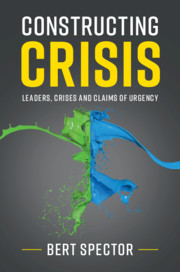Book contents
- Constructing Crisis
- Constructing Crisis
- Copyright page
- Dedication
- Contents
- Tables
- Preface
- 1 Undertaking a New Interpretive Effort
- 2 Crisis as a Reification of Urgency
- 3 Advancing the Crisis-as-Event Model
- 4 Problems, Crises, and Contextual Constructionism
- 5 An Objective Description and a Subjective Uh-Oh!
- 6 Believing Claims of Urgency – Or Not
- 7 The Power of a Good (Crisis) Narrative
- 8 To Create Such a Crisis, to Foster Such a Tension
- 9 Beyond Forged-in-Crisis Leadership
- 10 So What?
- References
- Index
7 - The Power of a Good (Crisis) Narrative
Published online by Cambridge University Press: 23 August 2019
- Constructing Crisis
- Constructing Crisis
- Copyright page
- Dedication
- Contents
- Tables
- Preface
- 1 Undertaking a New Interpretive Effort
- 2 Crisis as a Reification of Urgency
- 3 Advancing the Crisis-as-Event Model
- 4 Problems, Crises, and Contextual Constructionism
- 5 An Objective Description and a Subjective Uh-Oh!
- 6 Believing Claims of Urgency – Or Not
- 7 The Power of a Good (Crisis) Narrative
- 8 To Create Such a Crisis, to Foster Such a Tension
- 9 Beyond Forged-in-Crisis Leadership
- 10 So What?
- References
- Index
Summary
When Colin Powell appeared before the UN Security Council to stake his reckless claim (plausible but inaccurate) that Iraq’s Saddam Hussein was amassing weapons of mass destruction, he brought with him a credibility built up over years of service to the US government and its military. It was precisely that credibility that President Bush intended to leverage into public, even global support for his war of choice against Iraq. But there was something else in play when Powell made his claim.
Powell told a good story, one with a compelling narrative, a frightening villain, and a heroic posse ready to charge in to save the day. Jenny McCarthy told a forceful story as well, one with evil, uncaring scientists relying on “bullshit” research to pose a threat to the children of America. There is nothing like a compelling narrative to help convey a claim to its intended audience.
- Type
- Chapter
- Information
- Constructing CrisisLeaders, Crises and Claims of Urgency, pp. 140 - 164Publisher: Cambridge University PressPrint publication year: 2019
- 1
- Cited by



